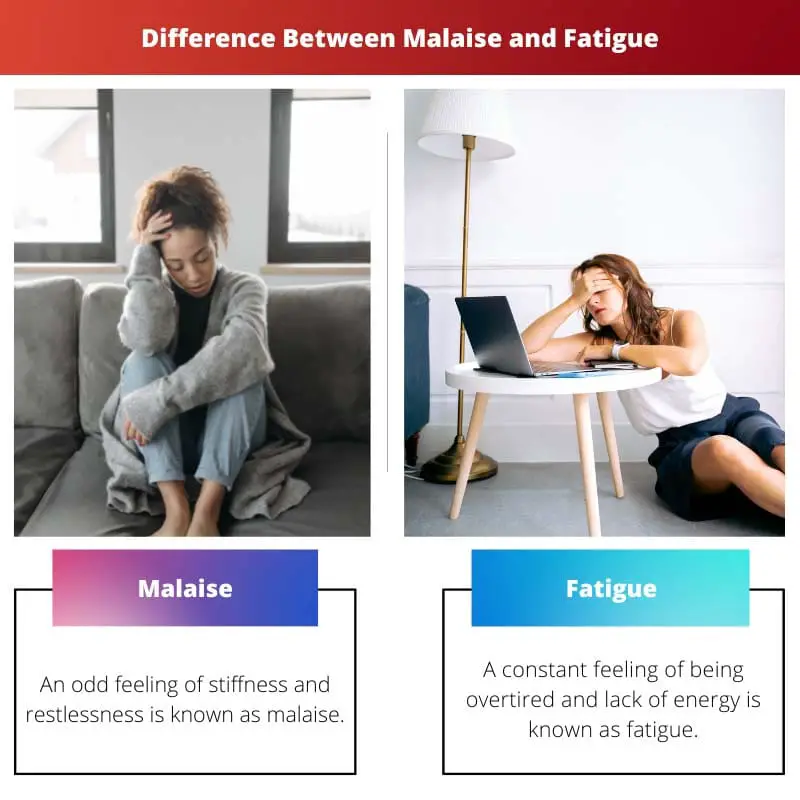The human body works like a machine, and if it is overworked, then it stops performing the general task. Such conditions can be elaborated as malaise and fatigue.
There is a limit required for the human body to work and get rest, and if these limits are breached somehow, the consequences aren’t very comforting.
A person should make a routine and follow it to be active for an extended period.
Key Takeaways
- Malaise is a general feeling of unease or discomfort, signaling the onset of an illness, while fatigue is a persistent state of physical or mental exhaustion.
- Malaise can be a symptom of various underlying conditions, including infections, autoimmune disorders, and psychological issues, while fatigue can result from overexertion, stress, poor sleep, or medical conditions.
- Malaise is more subjective and difficult to quantify, while a measurable physical or cognitive performance decline characterizes fatigue.
Malaise vs Fatigue
Malaise refers to a feeling of general discomfort or unease and is a nonspecific symptom indicating an impending illness or an uneasy feeling of discomfort, distress, or unease, physical. Fatigue, on the other hand, is a chronic state of tiredness, weariness, or lack of energy, not relieved by rest.

Malaise is a feeling of physical uneasiness and discomfort. It is associated with a lack of interest in general activities, and its cause is complicated to find.
Experts estimate that malaise might be caused by lack of sleep, some underlying disease, drinking or overeating, etc. Malaise is also referred to as general discomfort.
Fatigue is the feeling of being overtired and losing the desire to run daily errands. Fatigue causes low energy and a sense of constant sleeping.
General causes of fatigue are jet-lagged, ageing, heavy exertion, and overeating.
If a person feels any pain, dizziness, irregular heartbeats, and fever, he is suggested to see a doctor immediately.
Comparison Table
| Parameters Of Comparison | Malaise | Fatigue |
|---|---|---|
| Meaning | An odd feeling of stiffness and restlessness is known as malaise. | A constant feeling of being overtired and lack of energy is known as fatigue. |
| Cause | Doctors state that it is difficult to identify the cause of the malaise. They can only examine their lifestyle. | The primary cause of fatigue are issues related to mental and physical health and an imbalanced lifestyle. |
| Symptoms | The symptoms of malaise include a feeling of illness, soreness, weakness, mild pain, etc. | The symptoms of fatigue include headache, dizziness, sleepiness, lack of energy and motivation, etc. |
| Treatment | To minimize the impact of malaise, a person can do nothing but take plenty of rest. | To minimize the impact of fatigue, a person should exercise, consume a healthy diet, and less caffeine. |
| Associated with | Malaise is associated with physical health, and it has nothing to relate to mental health. | Fatigue is associated with both mental and physical health. It can leave a bad influence on both aspects. |
What is Malaise?
Malaise is a disease or condition that makes a person feel constantly ill and weak.
The person diagnosed with malaise loses his penchant for everything because he has no energy left in his body.
It can be the result of fatigue, and the person should rest as much as he can.
Malaise is very irregular; it might take a more extended period to be exposed entirely and can occur out of nowhere.
The same goes for the duration; malaise can last for weeks and can be treated within some days. Even the fundamental cause of malaise is not easy to recognize.
Some common malaise causes include injuries, trauma, or some disease. Sometimes it becomes so severe that a person can not get rid of it without seeing a doctor.
Some studies have shown that malaise can result from viral disorders such as hepatitis, HIV, Lyme, AIDS, fibromyalgia, etc.
Other than viral disorders, some chronic conditions can also be the reason for malaise, for instance, diabetes, anaemia, liver or kidney disease, heart failure, etc.
Surprisingly, some medications also cause malaise. If the symptoms are severe, the person should seek professional help and should not try to get self-treatment.
The doctor would examine the body and perform the required physical examination.

What is Fatigue?
Fatigue is sometimes seen as being drowsy and sleepy, but it is more than that. A person diagnosed with fatigue has no motivation and energy left to complete his daily business.
A great desire to get sleep might be a symptom of fatigue, but it is a different case.
Fatigue is an alarm to warn a person that he should get enough sleep, a healthy diet, and do some exercise.
People with mild symptoms of fatigue can get self-treatment at home, but if the symptoms are severe, the person is advised to see a doctor.
Fatigue also can be the result of imbalanced mental health and underlying disease.
Many years of observation have laid out the fact that various lifestyle factors can be the root cause of fatigue.
If a person has physical exertion, alcohol, too much caffeine, lack of nutritious food and sleep, drugs, depression, and stress, then the chances are high to get fatigued.
Also, people should consume sedatives and antidepressants with the proper guidance of the physician.
Fatigue can lead a person to severe disorders that can extend up to having suicidal thoughts.
Hence, it is necessary to recognize the cause of feeling low and see a related expert. One of the best pieces of advice to cure fatigue is drinking enough fluids and doing yoga.

Main Differences Between Malaise and Fatigue
- A person can feel mild pain if he’s suffering from malaise. On the other hand, a person suffering from fatigue can feel severe pain.
- The primary cause of malaise is not easy to identify by a person or even a doctor. On the other hand, the primary cause of fatigue is considered to be an unhealthy lifestyle.
- Malaise disease is the result of issues related to physical health. On the other hand, a person’s mental health also has a vital role to play in provoking fatigue.
- A person is suggested to take a plethora of rest to treat the malaise disease. On the other hand, fatigue is treated by exercising and having a nutritious diet.
- The significant symptoms of malaise are weakness, stiffness, and illness. On the other hand, the symptoms of fatigue are more severe such as serious pain, dizziness, depression, etc.

- https://www.researchgate.net/file.PostFileLoader.html?id=578352075b4952816016a5f2&assetKey=AS%3A382573365743618%401468224007055
- https://books.google.com/books?hl=en&lr=&id=j4w6frFAiQcC&oi=fnd&pg=PR17&dq=Fatigue&ots=AbaoJMeIaF&sig=y7w8yFu3U3ESp9jbuY8mx7b-x6Q